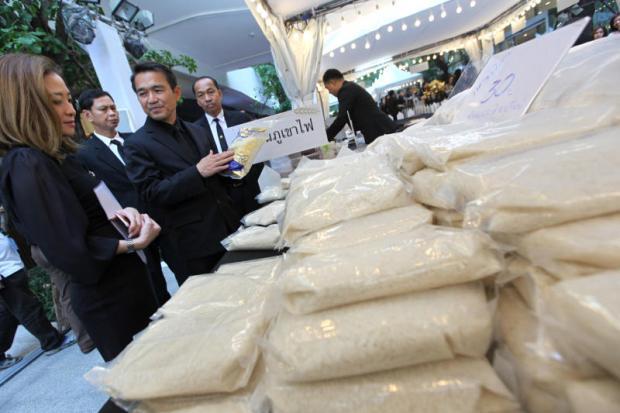Thailand: Mexico offers zero tariff for rice import
Thailand is expected to export 10,000 tonnes of long-grain white rice to Mexico soon after receiving a free import tariff quota from the Mexican government, says Commerce Minister Apiradi Tantraporn.
Mrs Apiradi said Mexico recently allowed zero tariff for 150,000 tonnes of imported long-grain white rice from March 2 to Dec 31 this year, as its government seeks to lower the country’s food costs and meet higher demand. Apart from Thailand, the Mexico has also granted the zero tariff for long-grain white rice to Argentina, India, Italy, Uruguay, Vietnam and the US. The country’s import tariff for rice is normally set at 20%.
Under the combined 150,000 tonnes this year, the Mexican government has set a maximum 10,000 tonnes per company to get free import tariff.
Mexico’s Ministry of Economy announced the quota for these countries on the Official Gazette recently, said Mrs Apiradi.
“The quota allocation will be done on first-come first-serve basis so Thai companies should moves fast to ensure they benefit from the quota,” said Mrs Apiradi.
Exporters can ask to ship rice under the quota at the National Agro-Alimentary Health, Safety and Quality Service (Senasica), which is the food and drugs authority of Mexico.
The quota accounts for 13% of total Mexican demand for rice in 2016 of 1.12 million tonnes.
Mexico relies heavily on imported rice. In 2016, its demand for imported rice rose by 7% from 2015 to almost a million tonnes, or 83% of total rice consumption last year.
The Mexican government has attempted to cope with the high demand over the past five years by promoting domestic rice plantation. Since then rice output per year has only risen by 8.5%.
In 2016, Thailand was the fourth largest long-grain white rice supplier to Mexico, with a 3% market share, following the US, Uruguay and Argentina.
The US share was as high as 45%, Uruguay 40% and Argentina 7.7% . Last year, Thailand shipped a total of 7,690 tonnes of long-grain white rice to Mexico worth US$ 3.3 million, which was about 50% lower than 2015, both in terms of volume and value.
The decrease of Thai rice exports in Mexico was mainly due to higher logistics costs than its rival countries.
Mrs Apiradi said that the ministry has planned to promote Thai rice more aggressively through Mexican rice importers and retailers such as Costco Department Store which operates 37 branches in Mexico, and Walmart. “Through these retailers, we hope to increase the presence of Thai rice among Latin American countries,” said Mrs Apiradi.
The Commerce Ministry anticipates Thai milled rice exports to reach 10 million tonnes this year, of which 5.2 million are expected to be sold in Africa, 2.2 million tonnes in Asia, 600,000 tonnes to the US, 400,000 tonnes to the euro zone, 360,000 tonnes to the Middle East and 210,000 tonnes to Oceania.
Rice sales through government- to-government deals (G2G) comprise deals with China, under which Thailand has agreed to deliver 100,000 tonnes per month this year. Further G2G deals are under discussions with Indonesia, Philippines, Sri Lanka, Bangladesh and Egypt.
Duangporn Rodphaya, director-general the Foreign Trade Department said the Commerce Ministry will lead the Thai delegation to Japan to meet rice exporters there in March 7-10.
She added that the Thai delegation hopes to discuss the opportunities to export short-grain white rice to Japan before Japan’s Crop Production Bureau of the Ministry of Agriculture, Forestry and Fisheries begins its annual rice import auction for 2017 in April until March 2018.
Thai rice shipments to Japan average more than 300,000 tonnes per year. In 2016, Japan imported 325,436 tonnes from Thailand, an increase of 15% from the year before.
For the first month of this year, Japan has imported almost 46,000 tonnes of Thai rice, an increase of 37% from last year.
Source: http://www.bangkokpost.com/business/news/1215397/mexico-offers-zero-tariff-for-rice-import


 Thailand
Thailand




